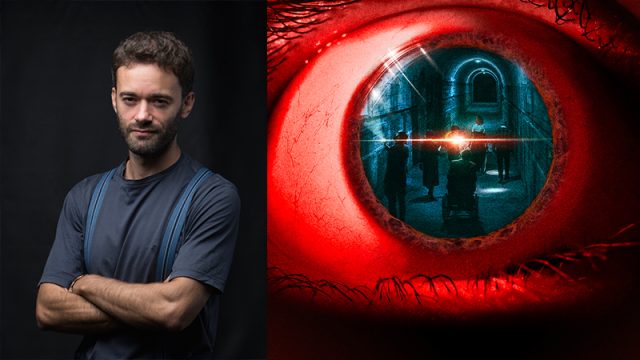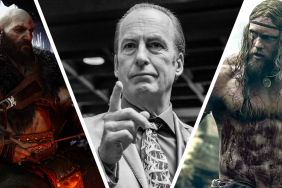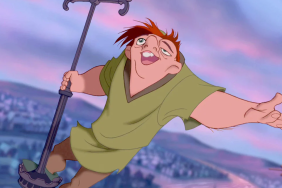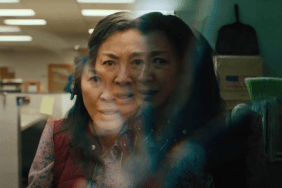ComingSoon’s Jeff Ames was able to speak with composer Umberto Smerilli about his score for The Bunker Game, which premieres on Shudder today. Smerilli’s other works include the 2021 film Framed, and the 2020 Italian comedy Il Regno, among others.
“After several mysterious accidents, a live-action role-playing game is interrupted and the players leave the bunker while the staff remains behind to investigate the disappearance of the game’s mastermind, Greg,” says the official synopsis.
Jeff Ames: What led you to become a composer?
Umberto Smerilli: I have always been attracted by invisible things that can affect us. In particular, the elusive things with a hidden structure, like magic, chemistry, or the way we make sense through symbols. Composing music is my personal way to deal with the invisible world of meaning, feelings and concepts that transcend the material world. It makes me reconcile with the darkness and tame the fire of passions that affect all of us.
Were there specific individuals in the field who influenced your style?
Yes of course, we all have mentors and reference figures.
When I studied film music at Italian School of Cinema I had the opportunity to know professor Federico Savina, who is an absolutely amazing sound engineer. He is the man who recorded immortal film scores of the golden age of Italian cinema. He worked with directors like Fellini, Antonioni, Visconti, Leone, and composers like Morricone and Rota. Savina’s “vision” of sound and music in the film deeply influenced mine, he gifted me with little secrets I’ll always thank him for.
On the composition side I have always been struck by Bernard Herrmann and his style, probably Vertigo is my favorite score of all time. I also think there might be a connection (harmonic? melodic? mood?) between Hermann and another one of my favorite composers, Giacomo Puccini. Even though he never scored a film (maybe because he died before the soundtrack was invented and cinema was still silent) I think he is somehow one of the greatest film composers ever. He really knew how to tell a story through music and to weave a dramaturgy of feelings.
How has your technique/style evolved over the years?
When I started composing, I had no experience at all on how to orchestrate and write music. So my ideas were all confined in the realm of the instruments I could play on my own or the extensive use of software to emulate and overdub. Then when studying theory, my technical possibilities widened and my music imagination grew. My path is something backward. I went from the computer to the pencil and paper. In the end, I feel the most comfortable when I can blend the two approaches together.
What was it about The Bunker Game that made you want to work on it?
The Bunker Game is not only a game for the participants and for the audience, it was also a big playground for me too. I knew it would’ve been an amazing opportunity to experiment and find new solutions and that was the case.
It’s quite common that films in the horror and thriller genres, despite having strong cliches, are also very tolerant to strong deviation from the standard narration. This aspect is not only tolerated but very welcome. So it was diving into the unknown. For instance, I blended thrilling sounds of bowed metal sheets, roaring self-built instruments, deep techno beats, crazy synths and a fantastic string orchestra to have an operatic breath. We wanted to be bold and rough and lyrical at the same time. Punch straight and make dream
What was the most challenging aspect of The Bunker Game and how did you overcome it?
The Bunker Game was my first horror movie. Before I began working on the film, I couldn’t imagine that instilling anxiety, fear, and unsettlement could be so close to arousing love and compassion in the viewer.
This was a great insight into my composition process and also opened new problems. The fact is there is a big difference between describing and instilling, this applies to love as to unsettlement. If you want to move the audience, your goal as a composer is not to describe emotions. The goal is to make people feel what happens on the screen and this is damn more difficult. So at the end of the process, my precious teaching is that love and fear are more closely related than I thought.
The solution to the problem was to not overdo it. We have to make room for the audience to fill in with their own fears. In the same way we tend to not relate to romance scenes with cheesy romantic music. This prevents us from entering the narration because it is already “full”, there is not the “emotional space” for us as the audience.
Do you have any fun, behind-the-scenes stories about the making of The Bunker Game that you can share?
Roberto Zazzara and I are close friends. After long working sessions last summer we used to go out for dinner and enjoy traditional food and wine from Abruzzo. One night in the middle of the countryside, we were driving back home in the almost total darkness, the only lights were the moon and the car lights. All of a sudden standing still in the middle of the road was an owl staring at us as an ancient god.
We stopped the car abruptly and were so freaked out, we were speechless for a while. We waited for the bird god to fly away, then kept going. What’s strange about this is, that very day we had spent hours working on a scene in which there is this elusive presence of an owl flying into the corridors… The day after we decided to completely change the music of the owl scene, and never spoke again of that encounter. This was just one of the strange coincidences that happened during the time I was working on the film.
What was your collaboration with director Roberto Zazzara like? How challenging was his vision?
The collaboration was great, not only for the food and wine shared. We have a common ground and a shared vision built around watching movies together and then analyzing them.
Roberto had a very precise idea of what kind of contemporary horror score he wanted for The Bunker Game. For example, Colin Stetson’s Hereditary and Mark Korven’s The Witch scores were references. I really appreciated these fantastic works pointing in new original directions. So the starting point was already challenging given the artistic value of the references. We also came up with a new idea discussing together. The story told in The Bunker Game is very dramatic and we wanted to stress this aspect. So we pointed toward the tradition of Italian Opera, trying to give an operatic breath to the main scenes. What we needed was just the scope and the width that Puccini’s scores have, the ability to deal with emotions deeply rooted in our nature. So we tried to borrow some of his tools and reinvent them.
Were there things you learned from working on The Bunker Game that you’re excited to apply to future projects?
This project opened new possibilities to my mindset. It really boosted my ease in managing heterogeneous music sources. My score for the film consists of analog synths, sampled instruments, a real string orchestra, self-built instruments, processed acoustic instruments, and various tortured objects. But in the end, everything contributes to a unitary vision.
Do you have any other projects coming up that you can share with us?
I am already working on a new project with Roberto Zazzara. It’s a documentary about a very peculiar race that has taken place in a small village in Abruzzo every year for centuries. The participants descend from a steep cliff mountain into stones and brambles barefooted. An apparently inexplicable religious rite.










